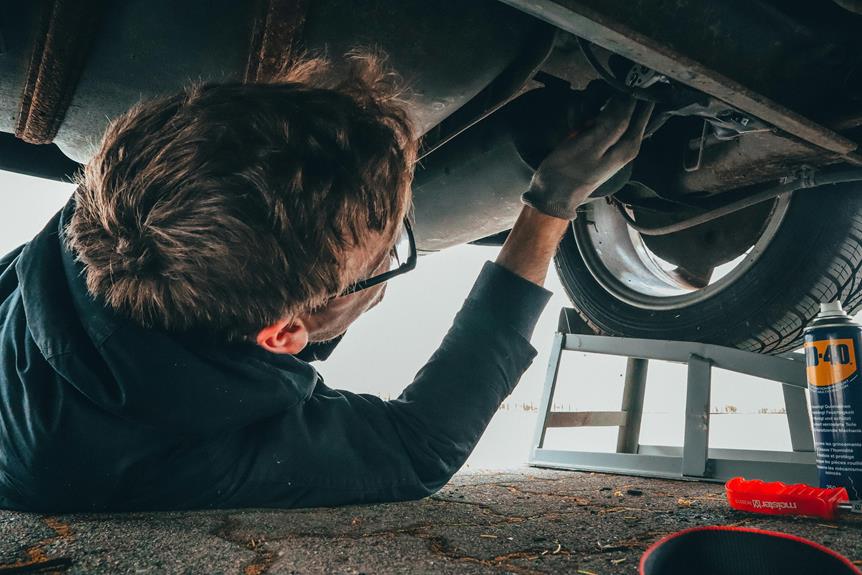
Regular car maintenance is essential for keeping your vehicle running smoothly. It helps extend your car's lifespan by addressing issues promptly, maintaining higher resale value, and preventing unnecessary wear and tear. By performing routine tasks like oil changes, tire rotations, and brake inspections, you can enhance fuel efficiency, optimize performance, and improve safety on the road. Taking proactive steps now can save you time and money in the long run, ensuring your car stays reliable and safe for your journeys. Understanding the importance of regular maintenance can make a significant difference in your overall driving experience and the longevity of your vehicle.
Prolongs Vehicle Lifespan
Regularly maintaining your car prolongs its lifespan. By staying on top of routine maintenance tasks like oil changes, tire rotations, and brake inspections, you can ensure that your vehicle continues to run smoothly for years to come. Neglecting these basic maintenance steps can lead to unnecessary wear and tear on crucial components, potentially shortening the life of your car.
In addition to routine maintenance, addressing any issues promptly can also contribute to prolonging your vehicle's lifespan. Ignoring warning signs such as strange noises, dashboard warning lights, or vibrations can lead to more significant problems down the line. By addressing these issues early on, you can prevent further damage and keep your car running efficiently.
Regular car maintenance not only extends the lifespan of your vehicle but also helps maintain its value. Well-maintained cars are more attractive to potential buyers and typically fetch higher prices when it comes time to sell or trade-in. So, by investing time and effort into regular maintenance, you not only benefit from a longer-lasting vehicle but also from a potentially higher resale value.
Enhances Fuel Efficiency
Improving your car's fuel efficiency can lead to significant cost savings over time. By ensuring that your vehicle is well-maintained, you can optimize its performance and get more miles out of every gallon of fuel. Simple tasks like regular oil changes, proper tire inflation, and clean air filters can all contribute to better fuel economy.
When your car is running efficiently, it burns fuel more effectively, reducing the amount of gas wasted during combustion. This means you can go further on a full tank, ultimately saving you money at the pump. Additionally, well-maintained vehicles tend to have lower emissions, which isn't only better for the environment but can also result in savings on potential fines or fees related to emissions testing.
Regular maintenance checks, such as tuning up the engine or replacing faulty oxygen sensors, can further improve fuel efficiency. By staying on top of these tasks, you can enjoy better mileage, lower fuel costs, and a smoother driving experience.
Prevents Costly Repairs
To prevent costly repairs, staying proactive with your car maintenance schedule is essential. Regular maintenance tasks such as oil changes, fluid checks, tire rotations, and brake inspections can help identify potential issues early on, preventing them from developing into major problems that could result in expensive repairs down the line. By keeping up with these routine maintenance tasks, you can ensure that your vehicle is running smoothly and efficiently, reducing the likelihood of unexpected breakdowns that could leave you with hefty repair bills.
Additionally, addressing minor issues promptly can prevent them from causing more significant damage to other components of your car. For example, a small oil leak may seem insignificant at first, but if left unchecked, it could lead to engine damage that requires expensive repairs. By catching and fixing these issues early through regular maintenance, you can save yourself both time and money in the long run. Remember, investing in preventive maintenance now can help you avoid costly repairs later.
Improves Safety on the Road
Staying proactive with your car maintenance can significantly enhance the safety of your driving experience on the road. Regular maintenance tasks such as checking tire pressure, ensuring brakes are in good condition, and replacing worn-out wiper blades can make a substantial difference in your safety on the road. By keeping up with routine maintenance, you reduce the risk of unexpected breakdowns or malfunctions while driving, which can be dangerous, especially at high speeds or in heavy traffic.
Proper maintenance also includes checking and replacing fluids like engine oil, brake fluid, and coolant, which are vital for your car's optimal performance and safety. Neglecting these essential fluids can lead to overheating, brake failure, or engine damage, putting you and others at risk on the road.
In addition to mechanical maintenance, ensuring that lights, turn signals, and brake lights are functioning correctly is crucial for visibility, especially in adverse weather conditions or at night. By taking these simple yet crucial steps, you can significantly improve your safety on the road and reduce the likelihood of accidents caused by preventable issues.
Conclusion
In conclusion, regular car maintenance is essential for keeping your vehicle running smoothly, saving you money in the long run, and ensuring your safety on the road.
By taking care of your car with routine check-ups and servicing, you can enjoy a longer lifespan for your vehicle, improved fuel efficiency, and peace of mind knowing that you're less likely to encounter unexpected breakdowns or repairs.
Make sure to prioritize regular maintenance to reap these benefits for your car.




